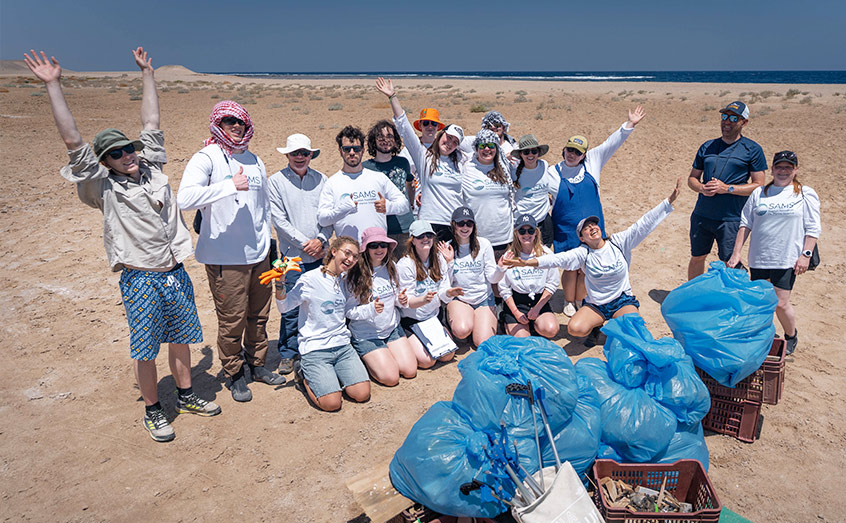SAMS news room
Totally tropical adventure for trailblazing students

Marine science students from SAMS, a partner of UHI, swapped the temperate waters of Argyll for the tropical Red Sea as they embarked on the Oban institute’s maiden field course in Egypt.
The 15 students, representing all four years of the BSc Marine Science Degree, spent 12 days at the Red Roots Sea facility in El Quseir and saw incredible sealife such as turtles, large moray eels and lionfish during snorkelling and diving expeditions.
The field course introduced underwater survey techniques, and the accompanying SAMS staff gave lectures on tropical marine ecosystems. The group also took part in beach litter and microplastic surveys.
Among the extra-curricular activities were recreational scuba diving and a day trip to visit the ancient temples at Luxor.
Prof. John Howe, BSc programme leader, was among the lecturers on the Tropical Marine Ecosystems field course. He said: “This was a really successful first trip to the Red Sea and the feedback from the students has been fantastic, so we are keen to do this on a regular basis.
“We have incredibly interesting temperate waters off Scotland, but we wanted to show the students a completely different environment. It is important that the next generation of marine scientists are exposed to – and trained in – as many different marine environments as possible.
“From coral reef surveys and fish diversity through to mangrove conservation and microplastic surveys, we were able to give them a fantastic experience that they’ll hopefully remember for the rest of their careers, wherever they go.”
The BSc Marine Science programme now includes pathways in Arctic Studies (since 2007), Oceanography and Robotics (since 2018) and Marine Biology (2023). The Tropical Marine Ecosystems field course is open to all students on all pathways, but it is most closely aligned with the new Marine Biology pathway.
The students undertook snorkel training prior to the visit in Oban, allowing them to explore and survey the coral reef at El Quseir. Despite reefs across the world suffering from coral bleaching, as a result of warming oceans, the reef at El Qusier was healthy, with diverse corals occurring from a shallow reef flat to very deep water.
Field trip student Karen MacKechnie said: “Going to the Red Sea, was an experience of a lifetime and one that I will never forget. It allowed me to develop my knowledge on the wonderfully biodiverse ecosystems of the coral reefs, seagrass, and mangroves, and taught me a valuable lesson on my body’s ability to handle mosquito bites!
“During our time there, we applied real scientific experiments and surveys which could potentially pioneer future research into these areas.
“It was an honour and privilege to have been able to attend the Red Sea expedition, and I cannot express fully my gratitude to those who had supported me through the contributions they made during my fundraising efforts to attend.
“I’m also extremely grateful for the amazing staff who guided us and supported us throughout the trip, ensuring that we were well taken care of and gave us the most amazing experience.”
Have you ever considered studying at SAMS? Find out more at Undergraduate — The Scottish Association for Marine Science (sams.ac.uk)
